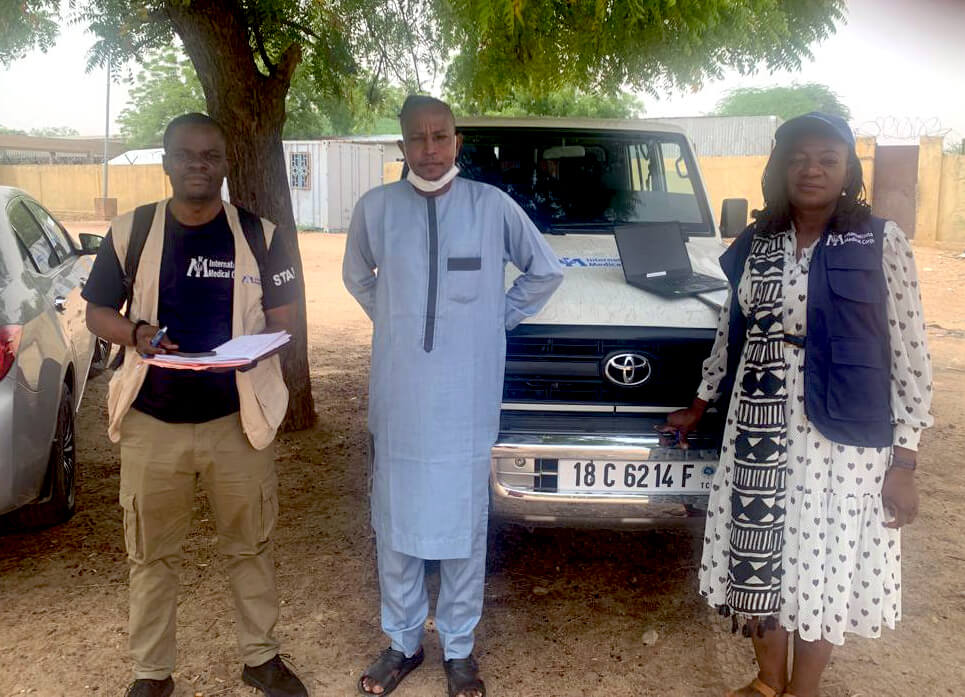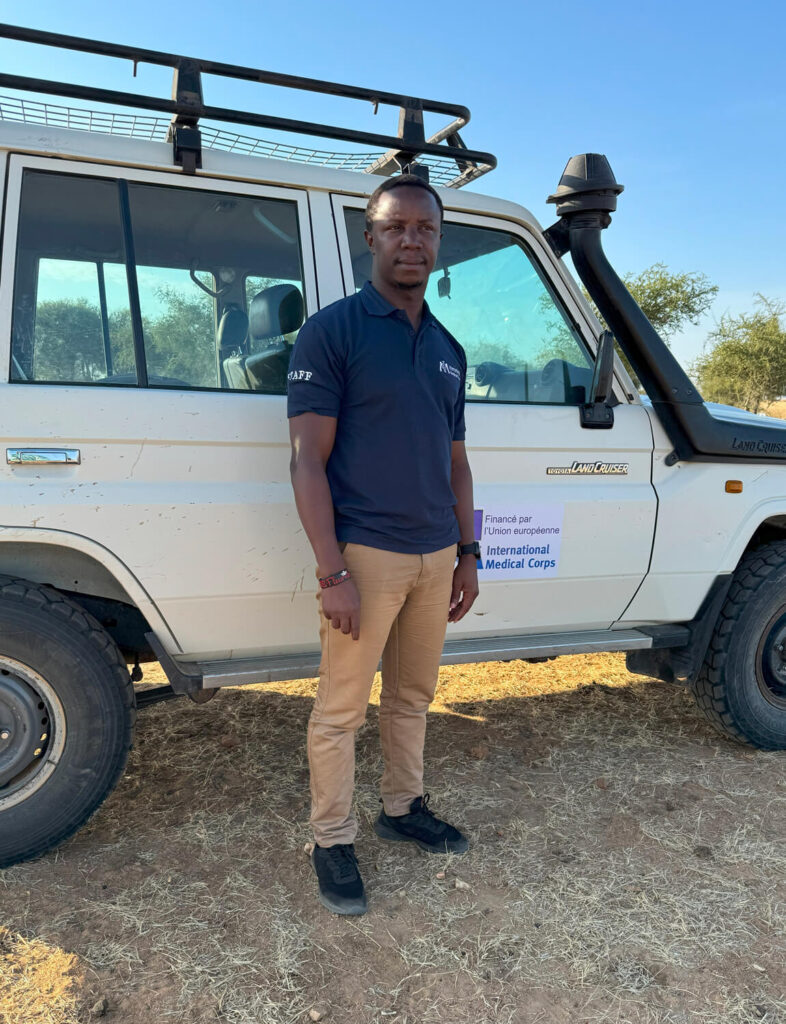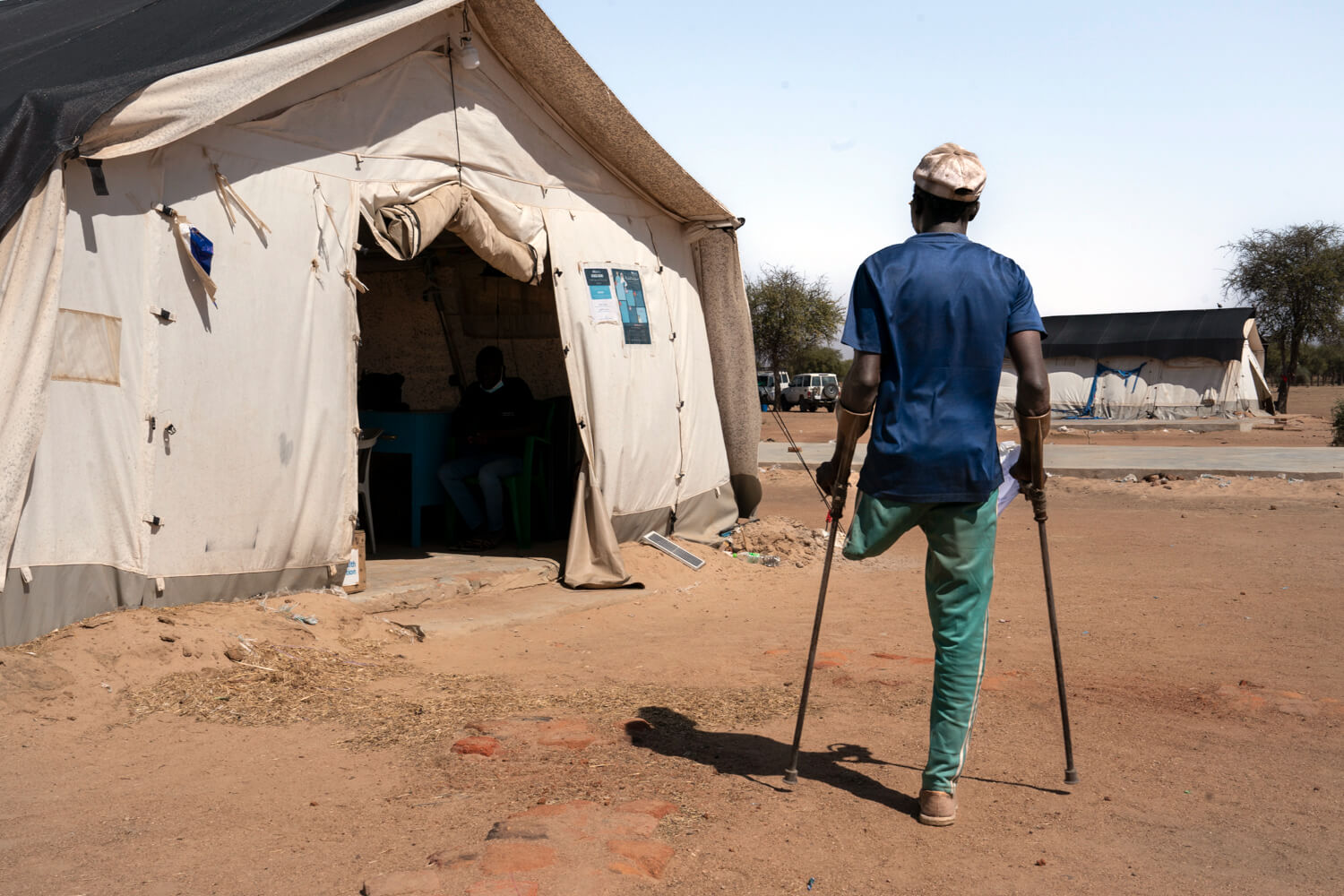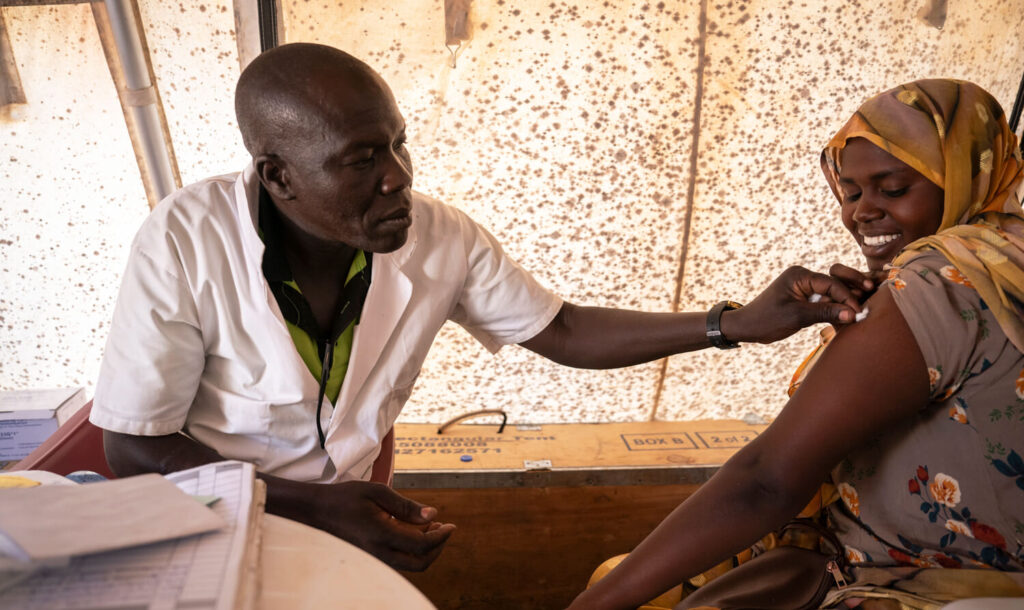Though International Medical Corps initially started working in Chad during the 2004 crisis in the Darfur region of neighbouring Sudan, we paused our work there in 2020. After civil war broke out in Sudan in April 2023, we realised we would need to return to Chad, both to supply our operations in Sudan and to help refugees fleeing across the border.
Many International Medical Corps staff members who had Chad connections or who had worked in our Chad mission but had moved to other country missions after the 2020 closure were keen to get reinvolved—some even going so far as to give up their free time to help the Chad mission get off the ground.
Zimbabwe Country Director Hamit Nassour is a native of Chad who started his humanitarian career in Darfur in 2003. Though he’d never worked for International Medical Corps in Chad before, he had interacted with us while working for another humanitarian organisation as the manager of Am Nabak refugee camp in eastern Chad. He eventually joined International Medical Corps and spent time in our Mali and Burundi missions before going to Zimbabwe.
Hamit saw that the current situation in Sudan was even worse than in the early 2000s. Knowing that International Medical Corps could help refugees in Chad, he contacted senior members of our Programs team to see if there were any plans for us to respond. When he learned that International Medical Corps intended to reopen the Chad mission, he immediately offered up his time.
“I told them that I could volunteer to help, and that I was going to Chad for a month for my R&R, so I could support them during that time,” says Hamit, who spent September 2023 in the country.
As a native Chadian with experience working with government officials as a country director, Hamit knew how to help move things through the country’s bureaucracy—including a memorandum of understanding with both the Ministry of Economic Planning and International Partnerships, and the Ministry of Finance and Budget.
“Going there with the experience I have, and being Chadian, I knew I could explain to officials the urgency and the impact that International Medical Corps could have on the people who are suffering in eastern Chad—particularly the Sudanese refugees and host communities,” Hamit explains.
And because his child’s paediatrician is an advisor to the Minister of Health, Hamit was quickly able to facilitate a meeting between the Ministry of Health’s Secretary General and our Senior Director of Emergency Response Dr. Javed Ali (for whom he also helped to procure necessary documents for travel within the country), as well as their teams. Hamit also helped recruit translation and security consultants who could accompany our Emergency Response team into the field and assist with rapid needs assessments.

A Group Effort
After Hamit left, Dr. Thierry Fikiri arrived in Chad in November 2023 and stayed until January 2024. Now Program Director in our Central African Republic mission, Dr. Thierry had run a field site in Baga Sola, Chad, from 2016 until our mission closed in 2020. Long after we had left, Dr. Thierry continued to get regular updates from community members, former International Medical Corps staff members and Ministry of Health staff members—who all expressed their hope that International Medical Corps would return quickly.
“We made a very big difference in Chad,” Dr. Thierry says. “I said that if we ever had the opportunity to relaunch the Chad mission, I would be among the first to go there.”
Once in the country, Dr. Thierry conducted a rapid needs assessment, talked with representatives from European Civil Protection and Humanitarian Aid Operations (ECHO) and developed a proposal that ECHO later funded.
As Dr. Thierry was leaving the country, Logistics Coordinator Theodore Fassa Leno was coming in. Theodore became our first—and, for five months, only—official staff member on the ground in Chad, making sure the mission could reopen and begin work. He arrived in January 2024, tasked with finding facilities that International Medical Corps could use as offices and checking on the possibility of cross-border activities with Sudan. He quickly conducted a market assessment to evaluate the logistic and operational context, including how we could move supplies, and sought out office space in the capital city of N’Djamena, as well as in Abéché and Adré.

“Being a one-man show, I worked on organising, going into the field and checking the border crossing, to see how we could get through,” Theodore says.
Once he secured office spaces in the capital and in the field, Theodore began the process of procuring office equipment and supplies. He also began procuring and receiving shipments of essential medicines—which we provided to the country’s Ministry of Health—as well as medical and nutrition supplies, hygiene kits and wound-care kits for people in Darfur. Procurement has been a challenge, because the security situation and poor roads in Chad make movement difficult. But Theodore has so far successfully received multiple shipments of supplies.
Fond Memories
As both Theodore and Dr. Thierry traveled around the country to assess our ability to relaunch the mission, they received an incredible response. They found that communities were hungry not just for humanitarian aid but for the work of International Medical Corps specifically. People remembered our programs—designed with local communities at their heart, with an emphasis on hiring local staff members—and were excited for our team to return. Former staff members living in Chad were keen to be rehired.
Understanding that Programs and Logistics rely upon one another for success, Theodore was enthusiastic about the chance to be part of building the Chad mission from the ground up. He had benefitted from humanitarian services as a child growing up in Guinea: an international NGO helped pay for his school fees, and his family sometimes relied on food distributions from UNHCR. Consequently, he is passionate about the work of organisations like International Medical Corps, where he has worked for seven years in missions in the Democratic Republic of the Congo, Nigeria and South Sudan.
“This work is very satisfying for me—to be one of the people who helped make this mission a reality,” Theodore says. “But there is still a lot to do.”
Staff Members Converge for Mission Reopening
Dr. Dorothy Dissake, our Medical Director in Cameroon who had worked in our Chad mission in 2004, deployed to Chad in May 2024—right as the mission was reopening and Theodore was taking a well-deserved break. She traveled to the eastern part of the country with Security Adviser Assim Salih and Dr. Thierry, who had also returned for the reopening, to visit the Dougui refugee camp and to meet with stakeholders, including representatives from UN agencies, ECHO and the Ministry of Health. In these meetings, Dorothy discovered that International Medical Corps had retained an excellent reputation in the community.

Today, there are 29 people working in our Chad mission, led by Program Director Souley Abdou, formerly of our Mali mission. They provide primary healthcare, emergency health services, mental health support and nutrition services, as well as medical referral services, to host communities and refugees in Dougui camp. We have facilitated the delivery of a medical donation to the Ministry of Health’s regional health delegation to treat refugees and host community members with non-communicable diseases, and are continuing to deliver medicine across the border into Sudan.



“I’m really glad that International Medical Corps is back in Chad,” Hamit says. “I want to thank management for reopening the Chad mission, because it’s really important for us to be there.”
